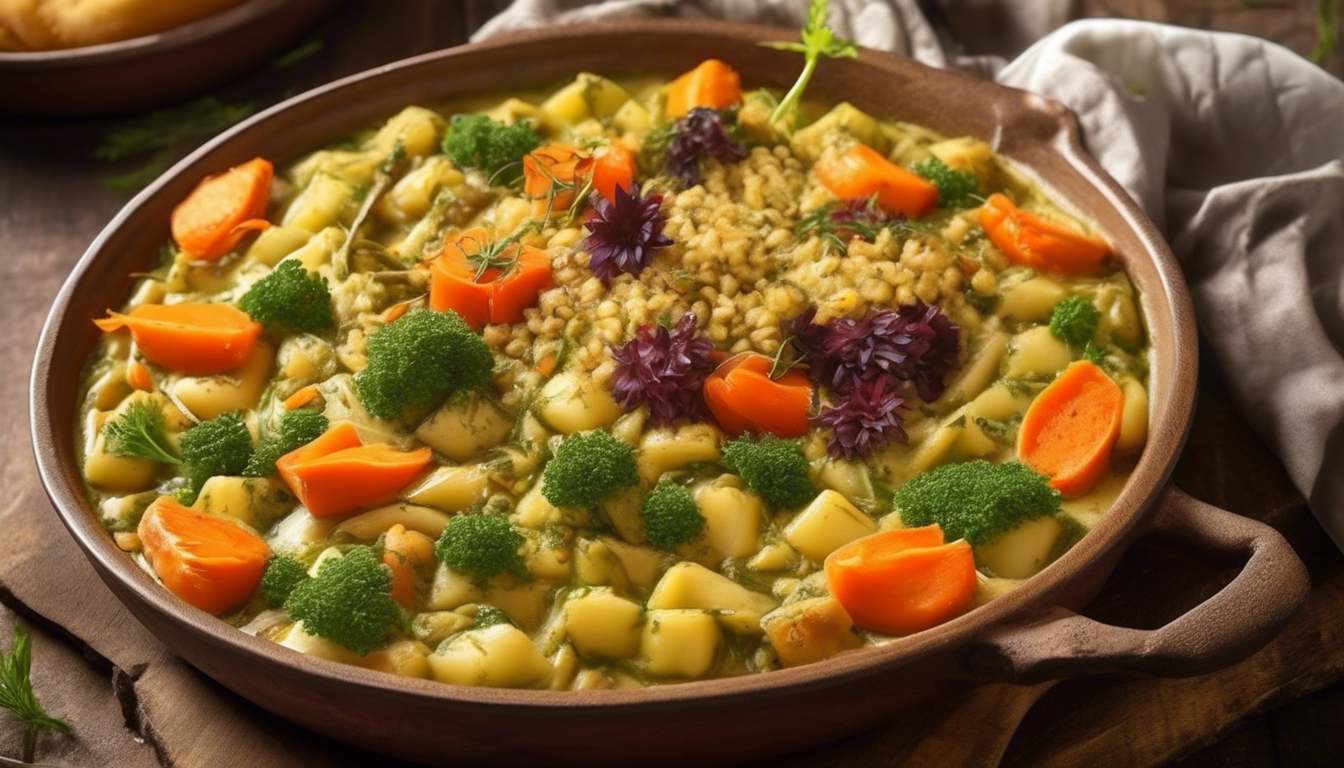Vegetarian-Friendly Dutch Dishes You Should Try

Exploring Vegetarian-Friendly Dutch Dishes: Traditional and Modern Variations
When you think of Dutch cuisine, your mind might conjure up images of hearty stews or rich meat dishes. However, the Netherlands has a delightful variety of vegetarian-friendly options that are worth exploring. Whether you’re a vegetarian looking for tasty alternatives or just curious about the flavors of Dutch cooking, there’s plenty to enjoy.
One popular dish that many people enjoy is Stamppot. This traditional dish is primarily made of mashed potatoes mixed with various vegetables like kale, sauerkraut, or carrots. The most famous version is boerenkool stamppot, which combines potatoes with kale and is often served with a vegetarian smoky sausage. Not only is it comforting, but it also provides a wholesome meal full of nutrients.
If you’re looking to try something unique, Hutspot is another must-try. This dish features potatoes, carrots, and onions mashed together to create a smooth and savory mix. It’s commonly enjoyed during the colder months for its warming qualities. While traditionally it is often served with meat, many restaurants now offer vegetarian versions that pair it with tasty plant-based options.
Next on the list is Erwtensoep, which is a thick pea soup usually made with split peas, vegetables, and herbs. While the traditional version includes meat, you can find fantastic vegetarian adaptations that keep the heartiness intact. Eating this warm dish, especially in the winter, is a true Dutch experience.
On the sweeter side, you can’t miss Oliebollen. These delightful doughnuts are perfect for enjoying during festivals or New Year’s celebrations. Made with flour, yeast, and various fillings like raisins or apples, these treats can easily be made vegetarian and are simply irresistible.
Belgian fries, or Patat, have become a staple snack in the Netherlands as well. Often paired with a variety of sauces, you can indulge in classic options like mayonnaise or try something more adventurous such as peanut sauce or curry ketchup. These are perfect for a quick snack or even a part of a light meal.
Vegetarian Bitterballen is another delightful option you should seek out. Traditionally, bitterballen are deep-fried balls filled with a mixture of beef or veal ragout. However, vegetarian versions are popping up at bars and restaurants, filled with tasty mushroom ragout or lentil mixtures. They are typically served with mustard for dipping and are a fantastic accompaniment to a cold Dutch beer.
For a light bite, you might enjoy Pompoensoep, or pumpkin soup. This dish brings a bit of seasonal comfort to the table. Made from roasted pumpkin, onions, and spices, it is creamy and often garnished with seeds. It’s an excellent starter that showcases autumn flavors beautifully.
If sweets are what you’re after, then Speculaas should definitely be on your list. This spiced biscuit is traditionally made with brown sugar, cinnamon, nutmeg, and cloves. While often enjoyed with coffee, you can find them made with vegetarian ingredients alongside various alternatives to fit your tastes.
- Stamppot: Mashed potatoes mixed with vegetables like kale or sauerkraut.
- Hutspot: A comforting mash of potatoes, carrots, and onions.
- Erwtensoep: Vegetarian pea soup that’s hearty and filling.
- Oliebollen: Sweet doughnuts made with a variety of fillings.
- Patat: Dutch fries served with an exciting mix of sauces.
- Vegetarian Bitterballen: Deep-fried vegetable-filled balls perfect for snacking.
- Pompoensoep: Creamy pumpkin soup flavored with seasonal spices.
- Speculaas: Spiced biscuits enjoyed during various holidays.
As you explore the vegetarian-friendly Dutch dishes, remember that many restaurants are eager to cater to dietary preferences. The culinary landscape in the Netherlands is continually evolving, with chefs creatively finding ways to reinterpret traditional dishes to suit a plant-based diet. There’s a whole world of flavors to discover. So, when you find yourself in the Netherlands, be sure to seek out these delicious vegetarian options and experience Dutch cooking like never before!
The Cultural Significance of Vegetables in Dutch Cuisine
Vegetables hold a special place in Dutch cuisine, reflecting the country’s agricultural heritage and cultural identity. From the fertile fields of Friesland to the coastal regions of Zeeland, the variety of vegetables used in traditional dishes speaks volumes about the Dutch love for local produce. Below, we explore the cultural significance of key vegetables in Dutch cuisine and their role in everyday life.
Roots of Dutch Culinary Traditions
The Dutch climate is particularly suited for growing root vegetables, which have become staples in diet and culture. Potatoes, carrots, and beets are just a few examples that take center stage in many classic dishes. These vegetables are not only easy to grow but are also nutritious, playing a fundamental role in feeding the population during harsh winters.
Potatoes
Potatoes are perhaps the cornerstone of Dutch cooking. They can be found in various forms, from boiled and mashed to fried as fries, widely beloved in the Netherlands. The traditional dish, stamppot, combines mashed potatoes with seasonal vegetables like kale or sauerkraut, creating a hearty meal perfect for the colder months. This dish represents more than just sustenance; it embodies the warmth and comfort of home-cooked meals, often shared among family and friends.
Carrots and Beets
Carrots and beets are other essential vegetables in Dutch dishes. Huts pot, a stew made with root vegetables, often includes these colorful ingredients. Their vibrant hues not only make the dish visually appealing but also provide a sweet, earthy flavor that complements the savory base. Carrots are commonly used in salads and soups, showcasing versatility in both raw and cooked forms.
Seasonality and Festivals
The significance of vegetables also extends to the Dutch calendar, with different vegetables celebrated throughout the seasons. For example, spring brings fresh asparagus, prompting festivals across the country that highlight this seasonal delicacy. Many Dutch locals eagerly anticipate these events, which include farmers’ markets and asparagus tours, where you can taste and buy the freshest produce available.
Asparagus Festivals
During the asparagus season, dishes like Asperges met ham en ei (asparagus with ham and egg) come alive on menus. This dish not only showcases the succulent taste of Dutch asparagus but also brings communities together as people celebrate the arrival of spring. It’s a reflection of how food can connect people and create cultural traditions.
Local Markets
Visiting local markets is another way that Dutch culture celebrates vegetables. Markets offer more than just fresh produce; they are lively gatherings where people share stories, recipes, and cooking tips. This community engagement reinforces the bond between food producers and consumers, emphasizing the importance of locally sourced ingredients in Dutch cuisine.
Vegetables in Modern Dutch Cuisine
With the rise of the farm-to-table movement and a growing emphasis on sustainability, modern Dutch chefs are creatively reinventing traditional recipes. Vegetables take center stage in innovative dishes that highlight their natural flavors. Seasonal vegetables are not just an ingredient but an inspiration for new culinary creations.
Plant-Based Innovations
Many chefs are experimenting with plant-based alternatives in staple dishes, further enhancing the cultural significance of vegetables. In cities like Amsterdam and Rotterdam, you’ll find restaurants dedicated to vegetarian and vegan cuisine, where traditional recipes are transformed to cater to new dietary preferences. This trend fosters a deeper appreciation for vegetables as versatile components that contribute to a sustainable future.
The Role of Education
Education about cooking with vegetables has become increasingly important in Dutch society. Many schools promote healthy eating habits and often include cooking classes focused on using fresh ingredients. These initiatives instill a love for vegetables in the younger generation, ensuring that the cultural significance of these foods is passed down.
Children’s Cooking Classes
Classes often incorporate fun, hands-on activities that teach children how to grow their own vegetables. This not only encourages a healthier lifestyle but also creates a lasting connection to the land and a better understanding of sustainable practices.
Vegetables are not just ingredients in Dutch cuisine; they represent a connection to the land, traditions, and community. The vibrant array of vegetables used in various dishes tells the story of the Dutch people, reflecting their agricultural roots and culinary creativity. From hearty comfort foods to innovative modern dishes, the cultural significance of vegetables in Dutch cuisine continues to thrive and evolve.
A Guide to Vegan Dutch Snacks for Your Next Gathering
If you’re planning a gathering and want to impress your guests with delicious vegan snacks, look no further than traditional Dutch treats! The Netherlands offers a variety of mouthwatering options that are not only vegan-friendly but also fun to make and share. Here’s a guide to some delightful vegan Dutch snacks that will surely wow your friends and family.
Stroopwafels
Stroopwafels, a classic Dutch treat, are perfect for snacking. Traditionally made with a caramel syrup sandwiched between two thin waffles, you can easily create a vegan version. Use vegan butter or coconut oil for the dough and maple syrup or agave for the filling. To enjoy them perfectly, warm them slightly over a cup of tea or coffee, allowing the syrup to soften.
Bitterballen
These small, crispy balls are a favorite Dutch snack. The traditional version is often made with meat, but you can make a tasty vegan version using mushrooms or lentils. Simply sauté some finely chopped vegetables, mix them with a creamy béchamel sauce, and then let the mixture cool. Shape them into balls, roll in breadcrumbs, and deep-fry or bake until golden brown.
Poffertjes
Poffertjes are fluffy, mini pancakes that are often served at fairs in the Netherlands. They’re easy to make vegan—just replace milk with plant-based milk and eggs with flaxseed meal mixed with water. Cook them in a poffertjes pan for that signature shape, and serve them dusted with powdered sugar or topped with vegan chocolate sauce for a delightful treat.
Oliebollen
These Dutch doughnuts are usually enjoyed during New Year’s celebrations but can be a hit at any gathering. To make oliebollen vegan, use plant-based yogurt instead of eggs and mix in raisins or apple chunks for flavor. Fry them until golden brown and sprinkle with icing sugar for a perfect sweet snack.
Vegan Dutch Cheeses
If you’re looking for something savory, try some vegan Dutch cheese. Many brands offer alternatives that capture the nutty and creamy flavors of traditional cheeses. Pair them with some freshly baked bread and olives for a delightful shareable platter. You could even make a vegan cheese board that includes various flavors, such as smoked, herbed, or spicy cheese.
Patatje Oorlog
This is a well-known Dutch street food dish consisting of fries topped with a mix of peanut sauce, mayonnaise, and onions. For a vegan twist, simply use vegan mayo and a homemade or store-bought vegan peanut sauce. This fun and unique snack will have your guests talking about your gathering long after it’s over!
Vegan Herring Salad
Cater to your adventurous crowd with a vegan version of traditional herring salad. Use roasted eggplant or marinated tofu in place of herring. Mix it with pickles, onions, and a flavorful vegan mayo for a satisfying spread. Serve it with crackers for a sophisticated snack option.
Licorice and Other Candies
The Dutch love their licorice, which is often vegan-friendly. Look for sweet or salty varieties, which can be a unique addition to your snack table. Other traditional Dutch candies, such as chocolate sprinkles (hagelslag) made with dark chocolate, can also make a fun topping for toast or pancakes.
Spicy Pea Soup
While more of a comfort food, serving small cups of vegan Dutch pea soup (erwtensoep) as a snack can be heartwarming. This dish is made from split peas, celery, carrots, and spices. Just ensure it’s prepared without meat, and serve it warm to keep your guests cozy.
- Stroopwafels
- Bitterballen
- Poffertjes
- Oliebollen
- Vegan Dutch Cheeses
- Patatje Oorlog
- Vegan Herring Salad
- Licorice and Other Candies
- Spicy Pea Soup
With this guide, you now have an array of vegan Dutch snacks to try for your next gathering. These options showcase the rich flavors of Dutch cuisine while keeping your guests satisfied and happy. So, roll up your sleeves, get creative in the kitchen, and enjoy the deliciousness of vegan Dutch treats!
How to Prepare Classic Dutch Comfort Foods with a Vegetarian Twist
When you think of Dutch comfort food, hearty meals like stamppot and erwtensoep often come to mind. But what if you’re looking to enjoy these dishes without meat? You can easily prepare classic Dutch comfort foods with a vegetarian twist. Not only do these dishes maintain the rich, satisfying flavors you expect, but they also introduce a fresh and exciting life to traditional recipes. Read on to explore some delicious vegetarian-friendly versions of classic Dutch dishes.
Stamppot: A Hearty Blend
Stamppot is a traditional Dutch dish made by mashing potatoes with various vegetables. The great news is that you can easily make a vegetarian version that will warm your heart. Here’s how:
- Basic Ingredients:
- 2 kg potatoes, peeled and cubed
- 1 kg of kale or sauerkraut (or mix both)
- 150 ml milk or a plant-based alternative
- 2 tablespoons butter or a vegan substitute
- Salt and pepper to taste
Preparation Steps:
- Boil the potatoes in salted water until tender, about 20 minutes.
- Add in the kale or sauerkraut during the last 5 minutes of boiling.
- Drain the potatoes and greens, then return them to the pot.
- Mix in the milk and butter, mashing until smooth and creamy.
- Season with salt and pepper. Serve warm!
This vegetarian stamppot makes an excellent side dish or can be enjoyed as a main meal. You can also add roasted vegetables for extra flavor.
Vegetarian Erwtensoep: Pea Soup Delight
Another classic Dutch comfort food is erwtensoep. Traditionally made with pork, you can still enjoy this thick pea soup without the meat. Here’s a simple recipe to try:
- Basic Ingredients:
- 500 g split peas
- 1 large onion, chopped
- 3 carrots, diced
- 2 celery sticks, chopped
- 2 large potatoes, diced
- 2 liters vegetable broth
- 1 tsp dried thyme
- Salt and pepper to taste
Preparation Steps:
- Rinse the split peas under cold water and place them in a large pot.
- Add the chopped onion, carrots, celery, potatoes, vegetable broth, and thyme.
- Bring to a boil, then reduce the heat and simmer for about 1 hour, or until the peas have softened.
- Season with salt and pepper, and blend for a smoother consistency if desired.
This vegetarian erwtensoep is perfect for a chilly day and goes well with crusty bread. You can also toss in some smoked paprika for a flavor twist.
Vegetarische Bitterballen: A Tasty Snack
If you love snacks, then bitterballen are a must-try! Traditionally made with beef, you can create a delightful vegetarian version that’s perfect for parties.
- Basic Ingredients:
- 100 g flour
- 1 onion, finely chopped
- 200 g mushrooms, chopped
- 300 ml vegetable stock
- 1 tablespoon mustard
- Salt and pepper to taste
- Breadcrumbs for coating
- Oil for frying
Preparation Steps:
- In a pan, cook the onion until soft. Add the mushrooms and cook until golden.
- Stir in the flour, cooking for a couple of minutes until mixed. Gradually add the stock, whisking to avoid lumps.
- Add mustard, salt, and pepper, mixing well. Let the mixture cool.
- Once cooled, shape into small balls, roll them into breadcrumbs, and fry in hot oil until golden.
Serve your vegetarian bitterballen with mustard or your favorite dipping sauce. These make an ideal snack for gatherings or simply enjoying with friends.
With these vegetarian-friendly Dutch dishes, you can experience the flavors of the Netherlands while sticking to a plant-based diet. Each dish reflects the comfort and warmth associated with traditional Dutch cooking, but with a modern twist that everyone can enjoy. So why not gather your ingredients and try your hand at cooking these comforting meals today?
The Rise of Plant-Based Eating in the Netherlands: Trends and Influences
The Netherlands has witnessed a significant shift towards plant-based eating in recent years, reflecting broader trends in health, environmental awareness, and ethical considerations. More Dutch people are recognizing the benefits of a diet rich in fruits, vegetables, grains, legumes, and nuts. This change is influenced by various factors that are transforming the culinary landscape of the country.
One of the primary drivers of this rise in plant-based eating is the growing awareness of health benefits associated with vegetarian and vegan diets. Research indicates that a plant-based diet can lower the risk of chronic diseases such as heart disease, diabetes, and certain cancers. Many Dutch citizens are becoming conscious about their health and increasingly opting for food that promotes longevity and wellness.
To illustrate this point, consider these health benefits of plant-based options:
- Rich in Nutrients: Plant-based foods are typically high in vitamins, minerals, and antioxidants.
- Weight Management: Many individuals find that a plant-based diet helps them achieve and maintain a healthy weight.
- Better Digestion: A diet high in fiber from fruits and vegetables can improve digestive health.
- Reduced Risk of Disease: As noted, plant-based eating is linked to a lower risk of chronic diseases.
Environmental concerns also play a crucial role in the shift towards plant-based diets in the Netherlands. With the increasing awareness of climate change and its impact, many Dutch people are recognizing that animal agriculture is a significant contributor to greenhouse gas emissions. By reducing their consumption of animal products, individuals are looking to lessen their carbon footprint. The Dutch government and institutions have even supported initiatives encouraging sustainable food choices among their citizens.
Moreover, societal influences such as celebrity endorsements, documentaries, and social media contribute to this trend. People are more exposed than ever to the benefits of plant-based diets through platforms like Instagram and YouTube. Influencers share delicious vegan recipes and demonstrate how easy it is to incorporate plant-based products into everyday cooking. As you scroll through social media feeds, you might find vibrant pictures of plant-based dishes that spark curiosity and invite individuals to try something new.
In addition to health and environmental impacts, ethical considerations are also driving this shift. Many individuals are concerned about animal welfare and the conditions under which livestock are raised. The realization that animal-based food production often involves significant cruelty prompts many to explore vegetarian or vegan alternatives. Organizations that advocate for animal rights and humane food practices provide information that nudges consumers towards plant-based options.
The rise of innovative products has also contributed significantly to the growth of plant-based eating. Grocery stores and restaurants across the Netherlands have diversified their offerings to make plant-based options more accessible. You can find various meat substitutes, dairy alternatives, and plant-based snacks that allow you to enjoy familiar flavors without animal products. This availability of delicious and satisfying plant-based foods makes the transition easier for those who are curious but hesitant.
The restaurant scene in the Netherlands has also embraced this trend. Many eateries offer creative vegetarian and vegan menus that highlight the rich flavors of plant-based ingredients. From gourmet plant-based burgers to traditional Dutch dishes reimagined with plant-based ingredients, the culinary options are endless. Here are some popular places where you can explore vegetarian dishes:
- Veggie Restaurants: Establishments solely focused on plant-based dishes.
- Cafés: Many coffee shops now feature plant-based options for breakfast and snacks.
- Food Festivals: Annual events celebrating vegetarian and vegan foods attract large crowds.
In recent years, educational institutions have also jumped on the plant-based bandwagon. Many schools in the Netherlands are implementing programs that promote plant-based meals in their cafeterias. This exposure at a young age fosters an understanding of the benefits of plant-based eating, promoting healthy eating habits that last a lifetime.
As you can see, the rise of plant-based eating in the Netherlands invites a variety of influences and trends. Whether it is health consciousness, environmental responsibility, ethical concerns, or culinary creativity, the shift towards plant-based diets is shaping a new and exciting food culture. Join the movement and explore the delicious world of plant-based dining!
Conclusion
Embracing vegetarian-friendly Dutch dishes is not just about food; it’s a journey into the heart of a rich culinary culture. These traditional and modern variations showcase how vegetables hold a significant place in Dutch cuisine, enhancing flavors and ensuring meals are both nourishing and delicious. The importance of these ingredients goes beyond mere sustenance; they reflect the values and history of Dutch society.
Gatherings are made even more enjoyable with a variety of vegan Dutch snacks that celebrate local flavors. With options ranging from crispy bitterballen made with plant-based ingredients to hearty soups packed with seasonal vegetables, you can impress your guests while being mindful of dietary preferences. Preparing classic Dutch comfort foods with a vegetarian twist means you can savor beloved meals while embracing a plant-based lifestyle.
The rise of plant-based eating in the Netherlands is reshaping food trends and cultural norms. More individuals are adopting vegetarian diets not only for health benefits but also for environmental considerations. This shift is influencing restaurants and home cooks alike, leading to innovative dishes that honor the essence of traditional recipes while catering to modern dietary choices.
Whether you’re a seasoned vegetarian or just exploring new culinary territories, the world of Dutch vegetarian cuisine offers something for everyone. Dive into this vibrant palette of flavors, and you’ll find that these dishes not only satisfy your appetite but also connect you to a dynamic, evolving food culture that prioritizes both taste and sustainability. Enjoy the delicious journey!





